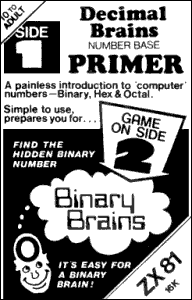| ZX-81 Software Scene |
TWO GRAPHICS adventures and a text-only adventure on one tape for the ZX-81 must represent good value of a sort, especially at only £3.20. The latest collection from Gavin Barker provides a reasonable introduction to adventure games, but is unlikely to fire the imagination of seasoned players.
The Challenge pits you against an evil knight in a medieval setting. You must equip yourself with the necessary weapons and armour, and seek out the challenger in his fastness.
The graphics are simple block pictures of castles, bridges, temples and the like, and the text is brief and occasionally badly spelt. The route to success is intricate, although there are a number of ways of achieving your goal, and all commands are drawn from a fairly limited vocabulary using standard two or three word inputs.
With over thirty-five locations and plenty of juggling with objects to be done - you are only allowed five at a time - it will take some time to work out your strategy.
Haunted House is written along similar lines, but in this case the graphics are rather better although the adventure itself is slightly less complex. Additionally there is a fight routine which enables you to deal with Ghosts, Mad Axemen, or a retired hangman. What Albert Pierrepoint is doing in an adventure game is not clear, however. You are also allowed to bribe the monsters if you have enough gold.
Both games include an interesting feature whereby if an object is already at a location then you cannot drop anything else there. That makes it all the more difficult to organise what you are carrying effectively, as you may have to backtrack a long way in order to find an empty location in order to drop such bulky and unwanted objects as a used match. It may not be very realistic but at least it increases the complexity of the game.
The third adventure is a text-only offering called The Black Staff. The game is rather more humorous than the other two, and is set in the standard world of wizards and dragons. Your job is to regain possession of the staff of the title. The ancient piece of wood used to belong to an old wizard but was stolen by some dwarfs. The dwarfs were turned to stone through neglecting the daily care of the staff and you are admonished at the start of the program to watch out or the same could happen to you.
The vocabulary for the adventure is rather wider than that of the other two, and some of the puzzles are more complicated, but by and large the game is of only moderate difficulty and should not take too long to solve.
Taking each on its merits, none of the adventures offers the kind of excitement of, for example, those from Artic or Carnell, but given that they are presented as a package at a reasonably low price, they do represent value for money.
The only real pity is that they were not written in machine-code, which would allow space for a considerably more sophisticated text interpreter and prevent the need for doing everything in FAST mode, thus causing the screen to flicker unpleasantly every time a key is pressed. That does not cause problems in the third adventure, but impairs the quality of the graphics in the first two, which would otherwise be much more pleasing.
Chris Bourne
| ADVENTURE | Memory: 16K | Price: £3.20 | Gilbert Factor: 6 |

SOME people find coping with hex-code and least significant bytes as easy as being sick on Watney's, but for every one of those hyperactive minds there are at least two humdrum souls who never even make it past binary numbers.
Binary Brains from Pooter aims to alleviate their misery by providing a primer in the theory of binary numbers, taking in octal and hexadecimal along the way. Once you have struggled through the primer, side two of the tape contains a mastermind-type game to see if you absorbed any of the material.
The information in the primer is accompanied by questions. The first set of questions is very boring, as it follows a fixed pattern. That is no doubt deliberate, in order to drum home the basic patterns formed by numbers, but may convince the less sensitive that number bases are as dull as they always thought. After the first round, the second asks more random questions.
The game asks you to guess at a number by entering a decimal number. The computer converts your guess into binary and compares it with its own number, and then tells you which digits you got correct. In order to win, and avoid the humiliating nickname of 'Decimal Brain' you will have to do a fair few decimal-binary, and binary-decimal conversions in your head.
There is an element of fun in the program, but the first part is stodgy and the game is either trivial or impossible, depending on whether you understood the primer or not. There has to be a more exciting and painless way of getting across the necessary information. Like reading a simple book, perhaps?
Available from Pooter Games, Essex.
Chris Bourne
| BINARY BRAINS | Memory: 16K | Price: £1.85 | Gilbert Factor: 5 |